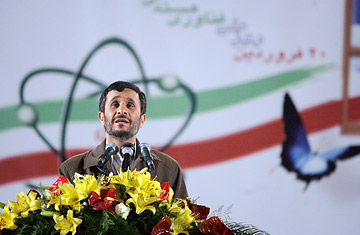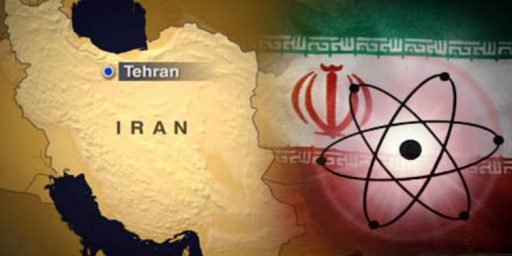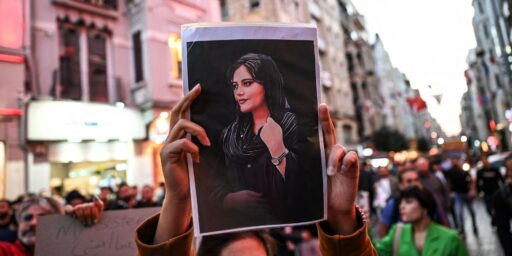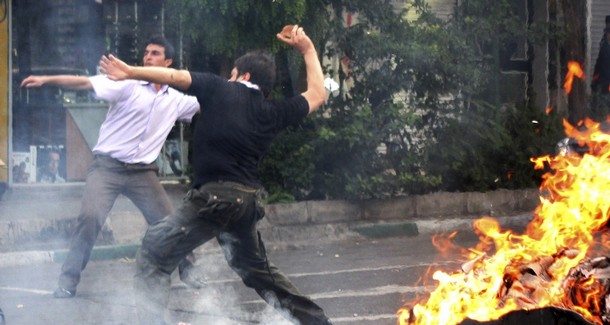Iranian Nukes Breakthrough? (Updated)
 Ayatollah Ali Khamenei and his gang of mullahs are said to be “seriously considering” the latest EU 5+1 proposals on resolving the international standoff on the Iranian nuclear program and are telling President Mahmoud Ahmadinejad to pipe down.
Ayatollah Ali Khamenei and his gang of mullahs are said to be “seriously considering” the latest EU 5+1 proposals on resolving the international standoff on the Iranian nuclear program and are telling President Mahmoud Ahmadinejad to pipe down.
Iran’s senior diplomat said Tuesday that Tehran was seriously considering a new offer from six world powers to resolve the dispute over its nuclear program, and he praised the package as “constructive.” The unusually positive remarks by Foreign Minister Manouchehr Mottaki to a small group of reporters raised hope that a negotiated solution can be found to defuse the crisis.
[…]
During a 90-minute luncheon at Iran’s United Nations mission, Mottaki dismissed the growing speculation that Israel or the United States will strike at Iran’s nuclear facilities during President Bush’s last six months in office. He described news reports to that effect as part of a long-running campaign of “psychological warfare.” The chance that Israel will attack Iran “is almost nil,” Mottaki said. As for a U.S. strike, he said there was little public support in this country for a new conflict. “The consequences of such an attack cannot be predicted,” he said.
Mottaki is a much keener observer of American politics than most Western observers, it would seem.
The European Union’s foreign policy chief, Javier Solana, conveyed the offer to Tehran two weeks ago. It essentially repackages a two-year-old proposal by Britain, China, France, Germany, Russia and the United States to give Iran political, economic and security rewards if it “verifiably suspends its enrichment-related and reprocessing activities.”
Presumably, the passage of two years has made it plain that no better offer would be forthcoming. Mottaki’s colleague, Ali Akbar Velayati, who serves as the top foreign policy advisor to supreme leader Ayatollah Ali Khamenei, offered some amusingly twisted logic as a face-saving explanation:
“Americans wanted Iran not to accept Solana,” Velayati told the hard-line daily newspaper Jomhuri Islami. “Therefore our interests imply that we should embrace Solana.”
Whatever works, I guess. This, though, is what got everyone’s attention:
In a sign of apparent high-level debate in Iran, a top aide to the country’s supreme religious leader made a veiled swipe Tuesday at Iranian President Mahmoud Ahmadinejad, who’s used belligerent rhetoric to defend Iran’s nuclear work. “Officials … should avoid illogical and provocative sloganeering,” Ali Akbar Velayati, a foreign policy adviser to Supreme Leader Ayatollah Ali Khamenei, said in published remarks, Reuters reported. His remarks seemed targeted at Ahmadinejad, although he didn’t mention the president by name.
While Ahmadinejad is the public face of the Iranian government, he’s by no means its most important player, despite the obsession with him by the media and some American politicians. As has been the case since the 1979 revolution, the clerics run the show with the Supreme Leader as the first among equals.
This, via Laura Rosen, strikes me as a fair read:
“What Velayati is presenting is a softening up of Iranian opinion as to why Iran might accept some sort of suspension without him going into that,” Trita Parsi, president of the National Iranian American Council, interprets Velayati’s remarks. “And then Velayati goes on to say that under the current circumstances, Iran can do this because of the fact that the international community has recognized Iran’s right to enrich. So in effect, Velayati is saying, Iran can declare victory and compromise, and that if it doesn’t do this, there will be a stronger case for war against Iran and a continuation of economic sanctions, which it’s very clear are hurting Iran’s economy.”
Of course, as Gholamreza Aghazadeh, head of the Iranian atomic energy organization, reminds us “as in everything in Iran, things could change tomorrow.”
Photo credit: Atta Kenare / AFP / Getty via TIME
Update (Dave Schuler)
I believe Iranian acceptance of this offer would be a benign development for all sorts of reasons of proverbial prudence including “jar-jar is better than war-war” and “half a loaf is better than none”. The offer should have a sell-by date or I see no reason that they’ll not deliberate it forever.
Unfortunately, it’s not nearly enough. The Iranian regime really needs to be more forthcoming about their past and present nuclear development activities for us to have any confidence that whatever nuclear development activity they cease is the nuclear development activity they have. Otherwise we’ll just be subsidizing their R&D.
The greatest danger I see in it is that European countries, blinded by a fog of Euro signs, will see Iranian acceptance of this baby stuff as big enough to take the pressure off Iran. 43% of Iranian imports are from the EU. That dwarfs China, the next largest vendor, by a considerable amount.
However, Iran’s import partners who are probably most able to influence the regime may well also be those necks are most on the line in the face of rising Iranian power in the region, Oman and Saudi Arabia (13th and 17th on the list, respectively). I don’t have detailed stats on the exports of these countries to Iran but I suspect their exports are mostly gasoline. Most of what Iran uses it does not refine itself.






Exactly. This is why a Kosovo/Iraq style ‘regime change’ operation would be unwise here. Ahmadinejad is a maniac, no doubt about it, nuclear sabre-rattling, bizarre holocaust denial conferences, a world-tour visiting anti-Western leaders, the whole shebang. But the fact that he’s drawn the ire of the West, and the fact that at times Israel (and maybe the US) have come seriously close to launching a strike, in the main because of his policies, and his deliberate escalations (uranium enrichment) mean that the mullahs, and moderate Iranians, want to see the back of him.
Expect Ahmadinejad to go in the 2009 elections.
Comment in violation of site policies deleted.
Indeed. And that raises the question of how much of this sabre rattling that Ahmadinejad is doing, is to mollify the Mullahs, and by reverse, how much of it would Iran be doing, sans the Mullahs. Is he a maniac, ir is acting like one simply a requirement of his position?
At the same time, clearly, they’re satisfied with him on some level, else he’d not still be wasting air, much less retaining the position he holds. So if he’s not crazy, then the source of it is the Mullahs, who will need to be dealt with in some fashion, and soon.
The problem here is the desire on the part of the Iranian leadership to destroy it’s neighbors, not the ability of itself. On that basis, I submit that any attack on Iran’s nuclear ability from Israel or anyone else, that does not also take out the real power structure in Iran… the Mullahs… is going to from a long term view, cause more problems than it solves.
That said, apparently this move by Iran is apparently in direct response to the threat of attack. So much for the claim that gunboat diplomacy doesn’t work.
Iran and North Korea are like a child who has the upper hand over his parent and knows just how far to push their luck.
The US is like the incompetent parent who wishes to avoid confrontation at all cost which is why the kid keeps staying in charge.
The scary result of unswift and certain punishment is that when it does come -it comes at the wrong time for the wrong reason.
That’s one major reason that I worry about a McCain temper and payback mentality and can’t vote for the man.
“‘jar-jar is better than war-war'”
Uh, isn’t it “jaw-jaw,” or has Lucas completed his takeover of the world already?
Indeed. It’s often written “jar-jar,” to both emulate Churchill’s speech and make the rhyme more obvious. But, yeah, “jar-jar” makes no sense whatsoever.
Probably going to take a lot of flak for this, but I think the current Bush administration is about what we need at the moment with Iran – bellicose unilateralists who the mullahs are afraid will attack them, but who lack the political capital and will to ever actually strike. Like Bithead said, the current “concessions” appear to be evidence of the success of gunbelt diplomacy, I’d go further and say that Iranian fears of US/Israeli action have turned the mullahs off Ahmadinejad and his rhetoric. His sabre-rattling is making him more enemies than friends. But to actually strike Iran would cause Iranians to rally around their president and endager Israel.
McCain, unlike Bush, actually would strike Iran. This would be worse than what we have at the moment. Obama, unlike Bush, wouldn’t make the Iranians feel under threat, and would make them feel that they have more leeway to be antagonistic and that would be worse than what we have at the moment. I’m no GWB fan, but maybe a pursual of his current trajectory would be an idea…
The mullahs can be removed from their positions too, so as long as Ahmadinejad has popular support, they won’t try to push him out for fear of a backlash against their own positions.